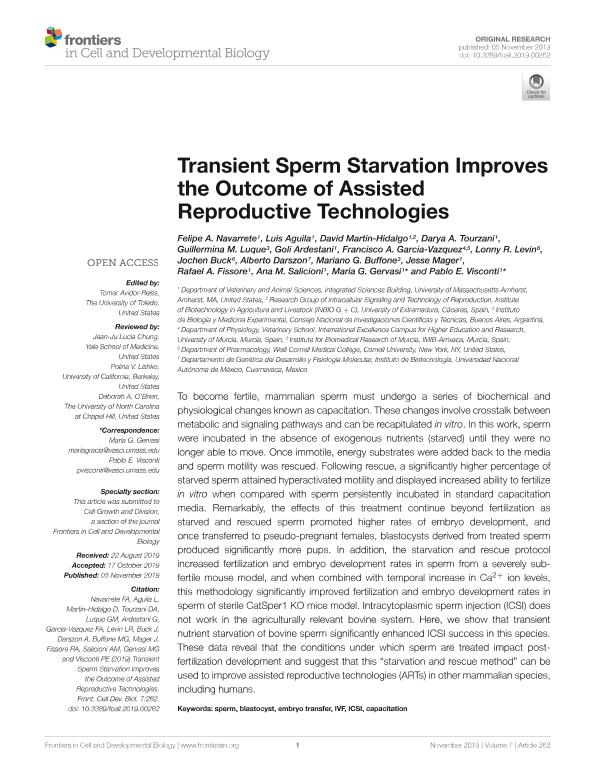Artículo
Transient Sperm Starvation Improves the Outcome of Assisted Reproductive Technologies
Navarrete, Felipe A.; Aguila, Luis; Martin Hidalgo, David; Tourzani, Darya A.; Luque, Guillermina Maria ; Ardestani, Goli; Garcia Vazquez, Francisco A.; Levin, Lonny R.; Buck, Jochen; Darszon, Alberto; Buffone, Mariano Gabriel
; Ardestani, Goli; Garcia Vazquez, Francisco A.; Levin, Lonny R.; Buck, Jochen; Darszon, Alberto; Buffone, Mariano Gabriel ; Mager, Jesse; Fissore, Rafael A.; Salicioni, Ana M.; Gervasi, María G.; Visconti, Pablo E.
; Mager, Jesse; Fissore, Rafael A.; Salicioni, Ana M.; Gervasi, María G.; Visconti, Pablo E.
 ; Ardestani, Goli; Garcia Vazquez, Francisco A.; Levin, Lonny R.; Buck, Jochen; Darszon, Alberto; Buffone, Mariano Gabriel
; Ardestani, Goli; Garcia Vazquez, Francisco A.; Levin, Lonny R.; Buck, Jochen; Darszon, Alberto; Buffone, Mariano Gabriel ; Mager, Jesse; Fissore, Rafael A.; Salicioni, Ana M.; Gervasi, María G.; Visconti, Pablo E.
; Mager, Jesse; Fissore, Rafael A.; Salicioni, Ana M.; Gervasi, María G.; Visconti, Pablo E.
Fecha de publicación:
11/2019
Editorial:
Frontiers Media S.A.
Revista:
Frontiers in Cell and Developmental Biology
e-ISSN:
2296-634X
Idioma:
Inglés
Tipo de recurso:
Artículo publicado
Clasificación temática:
Resumen
To become fertile, mammalian sperm must undergo a series of biochemical and physiological changes known as capacitation. These changes involve crosstalk between metabolic and signaling pathways and can be recapitulated in vitro. In this work, sperm were incubated in the absence of exogenous nutrients (starved) until they were no longer able to move. Once immotile, energy substrates were added back to the media and sperm motility was rescued. Following rescue, a significantly higher percentage of starved sperm attained hyperactivated motility and displayed increased ability to fertilize in vitro when compared with sperm persistently incubated in standard capacitation media. Remarkably, the effects of this treatment continue beyond fertilization as starved and rescued sperm promoted higher rates of embryo development, and once transferred to pseudo-pregnant females, blastocysts derived from treated sperm produced significantly more pups. In addition, the starvation and rescue protocol increased fertilization and embryo development rates in sperm from a severely subfertile mouse model, and when combined with temporal increase in Ca2+ ion levels, this methodology significantly improved fertilization and embryo development rates in sperm of sterile CatSper1 KO mice model. Intracytoplasmic sperm injection (ICSI) does not work in the agriculturally relevant bovine system. Here, we show that transient nutrient starvation of bovine sperm significantly enhanced ICSI success in this species. These data reveal that the conditions under which sperm are treated impact postfertilization development and suggest that this “starvation and rescue method” can be used to improve assisted reproductive technologies (ARTs) in other mammalian species, including humans.
Palabras clave:
SPERM
,
STARVATION
,
FERTILITY
,
MEDIUM
Archivos asociados
Licencia
Identificadores
Colecciones
Articulos(IBYME)
Articulos de INST.DE BIOLOGIA Y MEDICINA EXPERIMENTAL (I)
Articulos de INST.DE BIOLOGIA Y MEDICINA EXPERIMENTAL (I)
Citación
Navarrete, Felipe A.; Aguila, Luis; Martin Hidalgo, David; Tourzani, Darya A.; Luque, Guillermina Maria; et al.; Transient Sperm Starvation Improves the Outcome of Assisted Reproductive Technologies; Frontiers Media S.A.; Frontiers in Cell and Developmental Biology; 7; 262; 11-2019; 1-13
Compartir
Altmétricas



